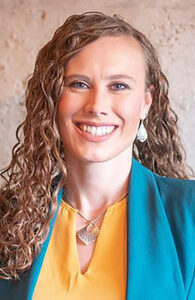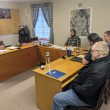 Jami Cate
Jami Cate
Jami Cate, 35, of Lebanon, has represented House District 17 for two years, elected in 2020 after former Rep. Sherrie Sprenger stepped down to run for a seat on the Linn County Commission. A lifelong resident of Lebanon, she earned a bachelor’s degree in Crop and Soil Science from Oregon State University and is a fifth-generation farmer in the Lebanon area. Her state House seat was her first foray into politics.
She has served over 15 years with the Lebanon Strawberry Festival, including as board chair and Association Treasurer; as secretary of the Lebanon Museum Foundation; as treasurer/secretary of the Oregon Tall Fescue Commission; and as secretary of the Lebanon Community Foundation.
She is the daughter of Jim and Ginger Cate, with siblings Jered and Chelsea Cate, niece Stella, and godchildren Vale and Holt.
Contact: (503) 986-1417 / [email protected]
 Tyler Collins
Tyler Collins
Tyler Collins, 38, of Brownsville, has resided in District 11 since 2019. He and his significant other share their household with nine children. In regard to education, “I don’t see my time in high school or UCC as my education. Through the years I have had significant on-the-job training and trade school scenarios that got me licensed in many skills.”
He bucked hay and worked cattle starting at age 12 in southern Oregon and by the age of 16 was working summers in six western states, welding geo-synthetic liners for holding ponds and landfills, including a superfund site in eastern Idaho for containment of nuclear waste.
He moved on to heavy equipment and then worked in oilfields on the north coast of Alaska.”If it’s hydraulic, diesel or electric, I can and will make it run.”
In 2016 he began building and refurbishing luxury railcars for Holland America Princess, designing and building electrical control systems, industrial HVAC systems, as well as maintenance and repair of diesel power generation. Most recently he has worked for a manufacturer of aggregate equipment i.e. rock crushers, mobile crushing and screening plants and track plants, in research and development of new systems and equipment.
“My entire adult life has been spent in problem-resolution positions. I know how to take something that is functioning poorly or not working at all and make it run like a well-oiled machine.”
Collins says he is “not a politician,” but has gotten involved locally with “school board issues,” “digging into the root of the current problems Oregon is facing.”
Contact: [email protected] / www.tylerfororegon.com
Describe your view of the proper role of government under the U.S. and Oregon constitutions and how you, as a state representative, would carry out your responsibilities as a legislator accordingly.
Collins: The role of government is to serve the people. We have been given an excellent framework in our United States Constitution and our Oregon State Constitution. Right now our state is riddled with administrative overreach and unconstitutional administrative rules. Everything I do will be based on constitutional law. Every vote that comes before me, my primary concern is whether or not it’s constitutional. I vow to rein in administrative overreach.
Cate: I believe our government is designed to work for the people – preserving our rights and freedoms granted by the Constitution, and maintaining order and safety. As State Representative, I have opposed the rampant government overreach we have been experiencing, and fought to restore the proper balance of power in Oregon. If re-elected, I will continue pushing for a government that works for the people, and serving as your voice on the issues that matter most to House District 11.
Why did you decide to run for the District 11 House seat?
Cate: “Politics” was never my ambition. I have always believed in being of service to your community, and felt very fulfilled in my service through various community organizations. But I couldn’t ignore the devastating impacts our government was having on my industry as well as every industry rural Oregon relies upon. I knew I needed to fight for my future where the problem was happening, and I’m not giving up. The fight isn’t over. So I am running for re-election.
Collins: I see the problems. I don’t see the problems getting better, I see them getting worse. I’ve decided to stay and fight to fix the problems. We must bring the agencies and our statutes back in line with our U.S. and Oregon state constitutions.
What do you see as the biggest challenges facing Oregon in the area of budget/state finances and what solutions would you propose to address those?
Collins: Our state has the second-highest income tax burden in the country. We are driving away business at the same time. This is not sustainable. We need to make our state business- friendly to encourage growth and in turn increase revenue with lower tax rates. We need to better budget the funds we currently have and refocus on the things that matter.
Cate: Our state budget continues to expand, with taxpayers owing more and more every year. The past two years have seen “historic” revenue figures for Oregon as we receive massive allocations from the Federal government, yet new taxes keep being proposed by our Democrat supermajority. Oregonians are already struggling to adjust to hyper-inflation and an unattainable housing market. It is time for less government – not more – reducing our state spending and providing Oregonians the tax relief they deserve.
What do you see as the biggest challenges facing Oregon in the area of education and what solutions would you propose to address those?
Cate: Oregon is experiencing a tremendous erosion to parental rights, especially in education. Our schools are ranked #48 in the nation, and are failing to prepare our kids for the realities of our job market. Parents wanting to engage in their students’ education and keep politics out of the classroom are being blocked from doing so by recent legislation to limit the powers of our elected school boards. We need to give parents more choice to pick the best schools for their kids, and focus on the fundamentals of education – not political ideologies.
Collins: Put parents back in control of their children’s education. Public school is a tax payer funded service to educate our kids. Public school is not a place for indoctrination. Parents have little ability to effect change. Parents need to have the ability to pick their children’s schooling and have the funding follow those kids whether it’s a public, charter, private or home school. Our public education system is failing our children and right now there is nothing giving the parents the ability to affect change. Allowing parents to choose their child’s type and location of school, would be an effective tool to get the education system to start listening to the parents. These are our children; we are not co-parenting with the government.
Crime rates and the role and need for law enforcement have raised concerns in recent years in Oregon. What do you see as necessities for the future of law enforcement in our state? How do you intend to implement your ideas, if elected?
Collins: We need to make sure our law enforcement has the tools and the funds to do their jobs effectively. We need to encourage community policing.
We need to discourage the revolving door that is currently our justice system. The last few years our governor has given criminals the green light in our state to do as they please. That has to come to an end.
Cate: I wholeheartedly believe in defending – not defunding – our law enforcement, and think it is imperative we give our officers the resources necessary to keep our communities safe. We have seen numerous pieces of legislation that remove tools from our officers, making it more difficult for them to do their job.
We cannot continue on the “soft on crime” path Democratic leadership is pushing, and need to invest in making law enforcement professions the honored and respected careers they once were to ensure we have the very best citizens filling these roles.
What do you see as the biggest challenges facing Oregon in the area of transportation and what solutions would you propose to address those?
Cate: Across our nation, our transportation infrastructure is failing and the financial resources haven’t been budgeted for replacement. Even projects that have been approved often fail to happen because of clashing ideologies when funds could be allocated for greener transportation methods.
Transportation is the backbone of our economy, and we have to invest in a system that meets the actuality of our growing communities’ needs – not an ideal of what some wish those needs looked like.
Collins: Right now the biggest issue is definitely the price of fuel. This is going to trickle down and cause inflation on everything from produce to diapers to auto parts. We need to promote the oil and gas industry in the near term to help alleviate this.
Most Oregonians don’t realize that a lot of Alaska’s drilling rigs were built here in this state. Now we’ve made that uneconomical and they are being built elsewhere.
What do you see as the biggest challenges facing Oregon in the area of environmental protection or lack thereof and what solutions would you propose to address those?
Collins: Our biggest failure pertaining to environmental protection would be the mismanagement of our forests. Our state seems to prefer to watch it burn.
I cannot recall how many years but I know the last few years our CO2 emissions from forest fires have far surpassed our transportation emissions. I keep hearing about the push to reduce CO2 emissions in ways that hurt our farmers and our timber industry rather than managing our forests and reducing the risk of out-of-control forest fires.
Cate: We have a ticking time bomb in our forests after decades of failed forest management policies implemented by our federal and state governments.
We all watched what can happen when the Labor Day fires of 2020 ravaged the Santiam Canyon and other regions across our state, and know too well the very real risk our forests now pose to our communities.
We need to let our loggers do their jobs – reducing fuel loads and actively managing our forests. I will continue advocating for policy changes at the federal level to do just that.
The lack of affordable housing and homelessness have become big issues in Oregon. What do you see as necessary steps to address these issues?
Cate: Oregon has made radical policy changes in an effort to address affordable housing, but in the next breath, continued passing increased regulations that add compounding expenses to the build cost of homes – leaving housing an unbearable financial burden for too many Oregonians.
If we truly want affordable housing, we need to stop adding more regulations that increase costs, and attract more people into the construction work force to meet the enormous backlog of demand for new construction.
Collins: It’s not just a lack of affordable housing, it’s a lack of housing in general. We need to encourage housing development throughout the state. We need to bring jobs into the rural areas where there is affordable housing and no work. If we encourage a healthy business environment and attract the jobs that come with it that would be a good first step. For decades this state has been killing the rural jobs and forcing people into the cities.
What are top issues you see in the area of healthcare in Oregon? How would you address those, if elected?
Collins: We are driving away a lot of doctors and healthcare personnel with our state policies. I personally lost two doctors and chiropractor to Idaho in 2021. We need to start asking ourselves why and address the problem.
Cate: Access is the critical concern in health care, and must be addressed through affordability, retention of care providers, and physical proximity.
The CAT (Corporate Activities Tax) has forced many pharmacies in our small communities to close, and even though we were successful in getting protections passed in 2022’s session to help save the small pharmacies that remain, too many of our communities are now without access to a component of health care.
If we are committed to improving overall access, we cannot keep increasing costs and forcing residents to drive to neighboring communities for care.
In addition to the areas above, what are the biggest issues you see facing rural Oregon and, particularly, the residents of the 11th District?
Cate: Oregon is far more than just Portland, and one-size-fits-all legislation doesn’t work. We routinely see Portland-centric legislation passed because it is the biggest voting base for the party in power – leaving the rest of Oregon’s needs kicked to the curb.
We need to bring balance back to our state government so the voice of all Oregonians can be heard when making legislation. I am fighting hard to support candidates across our state to win balance back and restore a government that works for the people rather than one-party rule loyal to the Portland-Metro.
Collins: Did not respond to this question.
What is your sense of the level of citizen awareness/involvement in the 11th District? What, if anything, needs to be done to improve in this area and, if you think this is a problem, what do you propose to do about it?
Collins: I know that the people in our district are becoming more aware of what’s happening in Salem. I plan to increase communication between the legislature and my district. I will do this with open communication and polls.
Cate: Most folks don’t have the time or energy to “live and breathe” politics, and they shouldn’t have to! House District 11 is full of average citizens, living busy lives and working hard to make ends meet. They should be able to trust that the government is working for the best interest of the people, but that isn’t what we are seeing out of our current state government.
My office has worked hard to keep even our busiest folks informed of the good and bad coming out of Salem through legislative updates and end of session summaries.
In the field of candidates in this year’s primary election, what sets you apart from the other individuals running for this office?
Cate: Experience has never been more important in the Oregon House. With redistricting creating new opportunities for advancement and a slew of retirements from public service, we are expecting a 50% turnover in the House from the 2020 election cycle. So many new members bring the excitement of fresh ideas, but also the desperate need for returning members who understand the process of advocating for the needs of Oregonians and are up to speed on the issues that matter most. I am excited to be in a position to help new members be successful in fighting for their communities.
Collins: I am not a part of the establishment. No one owns me. I will actually represent my voters. I’m a blue collar family man that has watched and listened to enough politicians to know that another establishment politician isn’t the answer.





